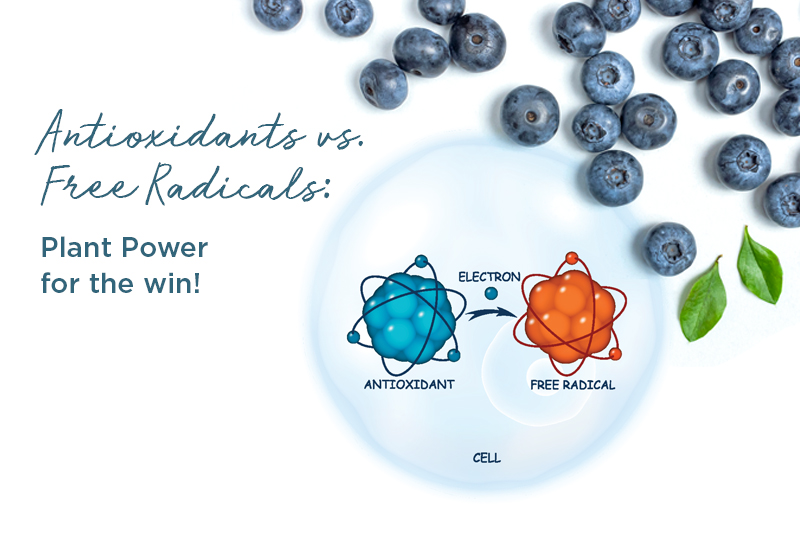By Melissa Crispell, ND, CNS, CNHP
The word antioxidant is a general term to describe something that can neutralize the damaging effects of free radicals. Antioxidants could be considered “cell defenders.” Free radicals are unstable molecules that can potentially damage DNA, cell membranes, and other parts of the cells.
Free radicals lack a complete set of electrons, so they steal the electrons from other molecules which end up damaging those cells in the process. Antioxidants donate electrons to neutralize the free radicals. By doing this, the antioxidant acts as a natural barrier to the domino effect of damaged molecules in the cells (free radicals) and other cells in the body that could become damaged (oxidative stress).
Damage and mayhem are to be expected with free radicals.
Our bodies create them in response to a number of exposures: tobacco smoke, air pollution, UV rays, not to mention they’re a natural by-product of the cell life process. Free radicals aren’t always detrimental. When the immune system initiates a defense, a free radical army is launched from the oxygen used. That free radical army destroys bacteria, viruses and damaged cells. We also produce free radicals during exercise – this can benefit us by sensitizing the muscle cells to insulin.
Our bodies can create some powerful antioxidants with the right foods too! Glutathione and alpha lipoic acid to name a couple. A good supply of antioxidants is necessary to disarm the damaging effects of free radicals. The food we eat will help supply other antioxidants like vitamins C and E. Dr. Jaffe refers to vitamin C as “the maternal antioxidant that sacrifices herself for all others”. Vitamin C donates the electrons and then the phytochemicals help to restore the vitamin C back to its original, active antioxidant form.
Plants are loaded with phytochemicals. Literally, plant – chemicals. Some antioxidant foods to support and what they provide are:
Carotenoids:
Tomatoes – lycopene
Kale – lutein
Flavonoids:
Cocoa – flavanols
Blueberries – anthocyanins
Apples and onions – quercetin
Green tea – catechins
While fruits and vegetables are rich sources of antioxidants, supplements like PERQUE Liva Guard Forté™ may also be beneficial but not a replacement for eating non-GMO, enzyme rich, nutrient dense foods. PERQUE Liva Guard Forté is formulated with silymarin and the preferred form of CoQ10 for powerful antioxidant protection and free radical prevention. PERQUE Liva Guard Forté protects the liver from cell and tissue damage associated with environmental toxicity and urban living. PERQUE Liva Guard Forté also gives the liver the needed support for better detoxification, improved energy, and healthier immune function.
Click here for more information on PERQUE Liva Guard Forté.
Click here to receive free samples.
About Melissa Crispell
 Melissa Crispell is a Certified Nutrition Specialist, Certified Natural Health Provider, Certified Lifestyle Educator, Certified Wellness Coach, and Certified Acupuncture Detoxification Specialist. Melissa has been published in Living Well, DC Practice Insights and Acupuncture Today.
Melissa Crispell is a Certified Nutrition Specialist, Certified Natural Health Provider, Certified Lifestyle Educator, Certified Wellness Coach, and Certified Acupuncture Detoxification Specialist. Melissa has been published in Living Well, DC Practice Insights and Acupuncture Today.
In addition, she has spoken at the Easter Seals Annual Caregiver conference, Functional Medicine Success Summit, American Association for Naturopathic Physicians, and is a member of the Health Studies Collegium speaker’s bureau and National Acupuncture Detoxification Association.
Melissa has served over 9 years as a Clinical Training Specialist for PERQUE Integrative Health, teaching physicians and providers all over the world how to grow their functional medicine practice using medical grade supplements and functional immunology.
Melissa’s mission is to empower people of all health statuses to take control of their wellness journey. This includes debunking myths and sharing basic health concepts that are frequently overlooked. Melissa believes that when we have better information, we make better choices.
